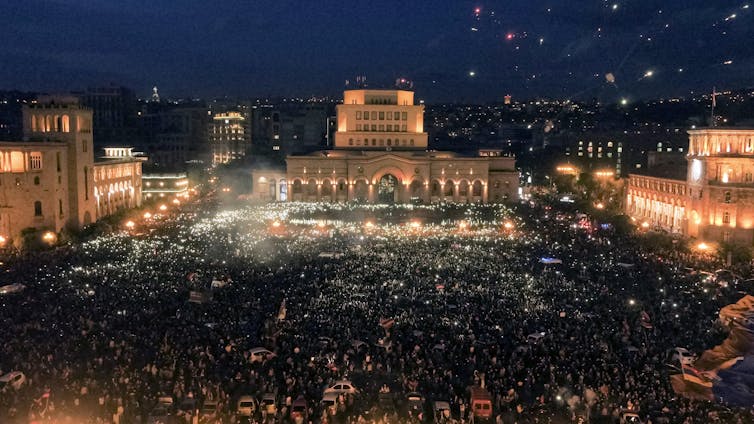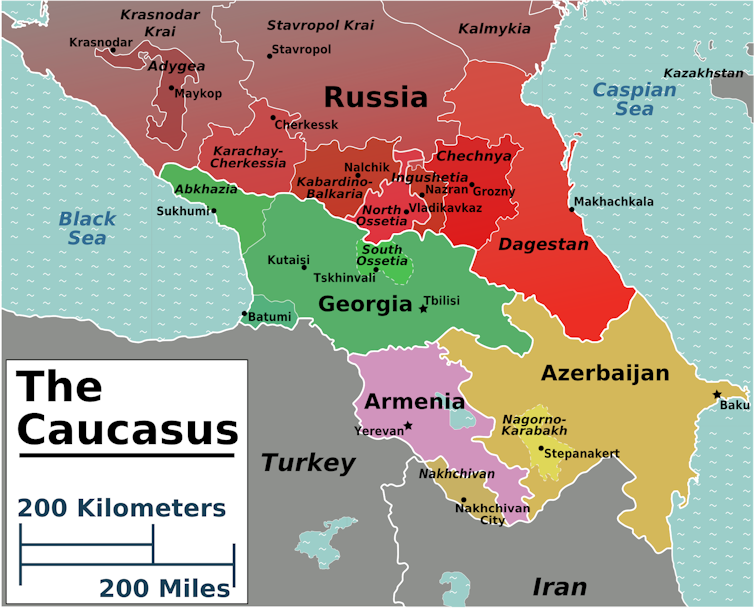Armenia rejects the 'politics of eternity'
- Written by Chase Johnson, Research Associate, Frank Church Institute, Boise State University School of Public Service , Boise State University
Armenia, Azerbaijan and Georgia, three countries in the South Caucasus once ruled by the former Soviet Union, still operate in the shadow of what is now called Russia.
The three states are located between Iran and Turkey on the western side and Russia to the north. What happens in them affects Russian interests in the region.
Russian President Vladimir Putin, over the last 18 years, has maintained strong political, military and economic relations – sometimes welcome, sometimes not – with these countries and their leaders in an attempt to keep them on Russia’s side. Russia’s intervention in Syria’s civil war and its growing alliances with Iran and Turkey makes maintaining influence over the South Caucasus states even more enticing[1] for Putin. He wants to be the guy in charge.
So when a head of state from this region resigns after a weeklong protest that draws a million people, as happened this week in Armenia, commentators are quick to proclaim that the sky is falling on Putin’s[2] sphere of influence.
One said[3], “Consumed by cynicism, the Russian ruler and his clique are incapable of accepting that spontaneous political uprisings by outraged publics are possible.”
I lived in the Caucasus for several years, as a U.S. Peace Corps volunteer and later as an academic[4]. What I think most analysts get wrong about Armenia is just how fiercely independent its people are. I believe Serzh Sargsyan’s forced resignation is less a story of Armenians repudiating Putin and more a story of Armenians getting fed up[5] with a leader running roughshod over their political system.
Toppling was straightforward politics
Armenia is small and poor[6], does not make or export much[7], and has two closed borders[8] with neighboring hostile states.
The Armenians also endured genocide at the hands of the Ottoman Empire[9] at the end of World War I. Armenians are the world’s most displaced people and millions more live abroad[10] than in Armenia itself.
Serzh Sargsyan resigned as Armenia’s prime minister on April 23, after over 25 years as a mainstay in Armenian politics. He served as the country’s president for the last 10 years and was only recently appointed[11] prime minister by the Armenian Parliament after constitutional changes[12] transferred most executive power to his new office.
In extending the rule of Sargsyan, Armenia followed the Putinist model of government.
Yale history professor Timothy Snyder astutely calls the Putinist model the “politics of eternity[13].” Such leaders disregard critical political moments and movements and leave little chance for peaceful transition of power or legitimate opposition[14]. The grand bargain of this model is the promise of political stability[15] in exchange for closed-door politics.
As a result, countries who adopt this model are rife with government corruption[16] and have little to no political freedoms[17]. In addition, most important sectors of the economy are owned by oligarchs[18]. Armenia is no exception.
While he was still president, Sargsyan initially announced that he did not have any ambition to serve as prime minister. Eventually, he retreated on that promise[19]. The protests became so potent because their request was simple[20]: Somebody else should be prime minister. That goal succeeded.
The Armenians’ strong instinct for self-determination makes me question those who now claim that outside agitators[21] such as billionaire George Soros[22], who funds pro-democracy efforts across the globe[23], have come to Armenia to topple the Putin model of government.
I believe the success of these protests was due to two main interests: opposition leader Nikol Pashinyan[24] of the transparently named Way Out Alliance,[25] and, later, the military’s embrace[26] of the protests.
The sky is not falling on Putin
Armenia will move forward with a complicated transition period in its independent way. But the questions people in the West should ask are: Where does Russia fit in to Armenia’s future, and what does Sargsyan’s toppling mean for Putin and his anti-democratic strongman brand of leadership?
 Opposition demonstrators gathered in the Republic Square celebrating Sargsyan’s resignation.
AP/Davit Abrahamyan/PAN Photo
Opposition demonstrators gathered in the Republic Square celebrating Sargsyan’s resignation.
AP/Davit Abrahamyan/PAN Photo
Armenia and Russia are still close allies[27] and likely will remain allies no matter who succeeds Sargsyan. Even the Armenian opposition agrees[28]. Russia maintains a military presence in Armenia, and is an important powerbroker[29] when it comes to Armenia’s territorial conflict with neighboring Azerbaijan[30].
The Putinist system usually works for those who wish to stay in power a long time. Sargsyan’s move to extend his control is just another in a long line[31] of the same[32] tactics used by such leaders as Belarus’ Alexander Lukashenko and Azerbaijan’s Ilham Aliyev. As in Armenia, Russia did not export the Putinist model to these places so much as these leaders eagerly adopted it.
However, popular protest can often force these systems into a difficult choice: use force to push them off the streets, or leave office. In Armenia, Sargsyan blinked and left office.
 Map of Armenia and the Caucasus region.
Peter Fitzgerald/Wikimedia, CC BY[33]
Map of Armenia and the Caucasus region.
Peter Fitzgerald/Wikimedia, CC BY[33]
Armenian future uncertain
Upon hearing news of the prime minister’s resignation, celebrations took place into the night[34] in the Armenian capital Yerevan’s Republic Square.
But the future for Armenia and its politics remain uncertain. It is unlikely that Sargsyan’s ruling party will hold snap parliamentary elections, even though Pashinyan has since called for them[35]). To do so would threaten their control of government more sharply than the resignation of their leader.
And even with Sargsyan out, it does not mean that his influence will disappear. Nor will Russia’s.
It is common for the governments in Armenia’s neighborhood and those following the Putinist model to have a political patriarch lead like the Wizard of Oz, from behind the curtain[36].
Armenia’s neighbor to the north, Georgia, has been controlled by the moderate Georgian Dream coalition for six years. It is widely accepted that billionaire oligarch Bidzina Ivanishvili directs that coalition[37], without holding political office and beholden to few checks on his power. Sargsyan could build a similar model of influence over Armenian affairs and continue his own “politics of eternity.”
Sargsyan’s forced resignation was a blow to the Putinist model of leadership. Yet, observers must recognize that the resignation of a figure like Sargsyan does not prove any broad proclamation about Western victories, or Russia’s ideological alternative.
It is simply a loud and important statement by fiercely independent Armenians. It cannot be called a victory for free and popular choice in Armenia. That fight is just beginning.
References
- ^ intervention in Syria’s civil war and its growing alliances with Iran and Turkey makes maintaining influence over the South Caucasus states even more enticing (www.forbes.com)
- ^ sky is falling on Putin’s (www.cnbc.com)
- ^ One said (www.washingtonpost.com)
- ^ as an academic (sps.boisestate.edu)
- ^ getting fed up (foreignpolicy.com)
- ^ poor (www.adb.org)
- ^ does not make or export much (atlas.media.mit.edu)
- ^ two closed borders (www.tandfonline.com)
- ^ also endured genocide at the hands of the Ottoman Empire (www.ushmm.org)
- ^ live abroad (lens.blogs.nytimes.com)
- ^ only recently appointed (carnegieeurope.eu)
- ^ constitutional changes (www.politico.eu)
- ^ “politics of eternity (www.theguardian.com)
- ^ or legitimate opposition (thebluereview.org)
- ^ promise of political stability (carnegieeurope.eu)
- ^ government corruption (www.transparency.org)
- ^ political freedoms (freedomhouse.org)
- ^ owned by oligarchs (foreignpolicy.com)
- ^ that promise (arminfo.info)
- ^ request was simple (www.rferl.org)
- ^ outside agitators (euromaidanpress.com)
- ^ George Soros (www.businessinsider.com)
- ^ funds pro-democracy efforts across the globe (money.cnn.com)
- ^ opposition leader Nikol Pashinyan (www.yahoo.com)
- ^ Way Out Alliance, (www.rferl.org)
- ^ military’s embrace (www.reuters.com)
- ^ close allies (www.washingtonpost.com)
- ^ opposition agrees (news.am)
- ^ important powerbroker (www.rferl.org)
- ^ Armenia’s territorial conflict with neighboring Azerbaijan (www.bbc.com)
- ^ long line (www.brookings.edu)
- ^ the same (www.nbcnews.com)
- ^ CC BY (creativecommons.org)
- ^ took place into the night (twitter.com)
- ^ Pashinyan has since called for them (www.aljazeera.com)
- ^ to have a political patriarch lead like the Wizard of Oz, from behind the curtain (eurasianet.org)
- ^ directs that coalition (eurasianet.org)
Authors: Chase Johnson, Research Associate, Frank Church Institute, Boise State University School of Public Service , Boise State University
Read more http://theconversation.com/armenia-rejects-the-politics-of-eternity-95489

